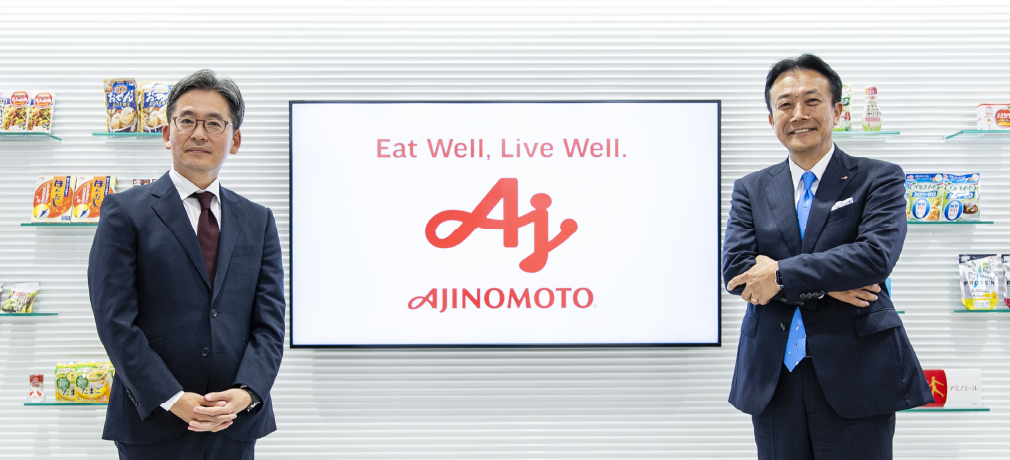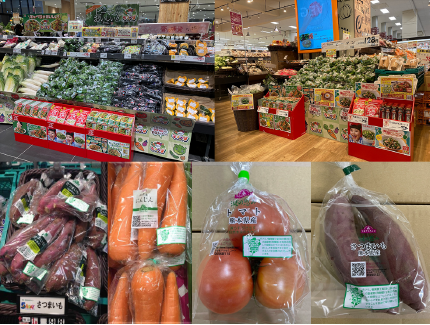
Accenture
Manufacturing and Distribution Division -- Industry Lead for Consumer Goods and Services in Japan
Managing Director
Ajinomoto Co., Inc.
Member of the Board, Representative Executive Officer, President & Chief Executive Officer
The food production and agricultural world is facing massive changes in the wake of the COVID-19 pandemic and the Russo-Ukrainian war. In order to tackle the fundamental challenges facing humanity, the food industry must revolutionize and adapt with future-oriented business strategies. To this end, Nikkei BP presents the Nikkei MOOK publication, “The Evolution of Food and Agriculture.” This publication introduces key solutions and case studies for each subtopic within the overarching sphere of food and agriculture. Editorial supervisor Daishi Miyao of Accenture, and Taro Fujie of Japanese food industry leader Ajinomoto Group discuss what steps the industry can take to secure the future of food and health.
Miyao: Under the slogan "Eat Well, Live Well." the Ajinomoto Group aims to solve major food and health problems through their global business operations. The Ajinomoto Group presented the ASV (Ajinomoto Group Shared Value) creation model in their 2014-2016 mid-term business plan. I think it has been an incredible driving force. Please tell us where ASV stands now.
Fujie: By working to solve social issues with industry initiatives and creating social value, ASV sets two goals. Our first goal is to extend the healthy life expectancy of 1 billion people by 2030. Our second is to reduce environmental load by 50% from 2018. To accomplish this, we aim to reach net-zero plastic waste by 2030, among other objectives. We're approaching the first outcome with what we call “Nutrition Without Compromise.” That means bettering nutrition without compromising on ”good taste,” “access to food,” and “differences in individual or regional eating habits.” For example, we understand that reducing sodium intake is good for health, but it can’t last long if it’s not delicious. The Ajinomoto Group, therefore, works to offer “tasty, low-sodium foods.” As another example, we are also working to address the global lack of protein in healthy diets with flexible solutions based on nutrition without compromise. Recently, we've been having internal discussions over health being intertwined with happiness. Naturally, physical health is important, but preserving mental well-being is just as crucial. We strive to make our company slogan — “Eat Well, Live Well.” — a reality by advancing this cause.

Ajinomoto Co., Inc.
Member of the Board, Representative Executive Officer, President & Chief Executive Officer


Accenture
Manufacturing and Distribution Division -- Industry Lead for Consumer Goods and Services in Japan
Managing Director
Miyao: With Japan's relatively higher-aged population compared to the rest of the world, we face two major social issues. First, how do we close the gap between average life expectancy and healthy life expectancy? Second, how do we achieve wellbeing as a long-lived society? To address these issues, we must look to what we eat. I believe it is crucial that we, as a society, redefine the value and role that food plays in our lives. The Ajinomoto Group seeks to accomplish this by transforming food from health into happiness. In order to implement this idea in a more tangible way, the Ajinomoto Group is likely tasked with working to spread the company's “purpose” internally and strengthening engagement. Could you give us more details about the steps you're taking to achieve this?
Fujie: In recent years, we've taken steps to reward innovation and creativity by granting the ASV Award to initiatives that focus on creating both social and economic value. We've also linked ASV to our employees' personal goals with things like showcases. A growing number of our employees are taking personal initiative with ASV. We're driven by “Purpose x Passion x Operational Excellence (OE)”. Purpose and passion are especially important to us. We say that we want our employees' personal purposes to overlap with the Ajinomoto Group's philosophy of solving social issues of food and health. When these ambitions overlap, our passion grows naturally, and more of our talented employees can work autonomously. In doing so, I believe we end up closer to realizing ASV.
Miyao: As value systems and the environment in which we do business change, it is becoming more important than ever to clarify what we value and what we want to achieve. It has also become more important to find agreement both inside and outside of the company as we tackle purpose-driven management. I understand that the Ajinomoto Group is promoting ASV based on the principles of purpose-driven leadership and is already undertaking many initiatives to solve social problems while creating value.
Fujie: Yes. For example, we've been working in Vietnam for the past ten years or so to improve nutrition in children's school lunches. In Japan, we take it for granted that our children have access to nutritious school meals, but that is actually quite rare. Many countries lack licensed dietician organizations. Therefore, we partnered with the Japanese Ministry of Health, Labor and Welfare, JICA, the Japan Dietetic Association, the Ministry of Health of Vietnam, and the local academic community to support the creation of a Vietnamese dietician organization and provide nutrition education for families through the schools. Using what we've learned from our experience in Vietnam, we want to further improve nutrition all over the world.

Ajinomoto's efforts to improve nutrition in Vietnam.
Miyao: At Accenture, we predict that purpose-driven leadership will rapidly expand to new markets and drive growth in the GDP of developed nations in the near future. There are multiple approaches to purpose-driven leadership, but all of them share a common concept: designing for the future as it should be, or as we would like it to be. In the example of the Ajinomoto Group's work with Vietnam, cooperation between the Japanese government, the Vietnamese government, and consumers, to build toward the common purpose of a food and health solution leads to a much greater impact and creation of new value. This is a perfect example of purpose-driven leadership.
— How to Meet the Challenge of Food Security
Miyao: Unease about food shortages caused by the COVID-19 pandemic and the Russo-Ukrainian war has, once again, reminded society of the importance of food security. It has become more important than ever to address the global issues of increased demand for food and food shortages caused by population growth and the expansion of the middle class, primarily in developing nations. Meanwhile, Japan's food self-sufficiency rate stands at 38%.* This presents us with the twin challenges of increasing food production and supporting agriculture. What is the Ajinomoto Group doing to help ensure food security?
*Self-sufficiency rate is based on calories.
Fujie: We are harnessing green innovation to increase food production and amino acids in livestock feed to cut down on grain use. At the same time, we are also working to reduce our environmental impact. For example, we put our waste to good use by installing biomass boilers and also strive to reduce food waste overall. In our efforts to support agriculture, we encourage consuming more than 350 grams of vegetables a day with our Love Vege® program. As a further example, we also worked with the Saga prefectural government and Aeon Kyushu to create the Kyushu Prime Vegetable label, which applies to vegetables grown with compost made from the waste products of our factories. In this way, we understand food security cannot be tackled by any one company alone. I believe it is crucial to proactively reach out across the industry and collaborate with national and local governments.

Ajinomoto's Love Vege® program and the Kyushu Prime Vegetable label.
Miyao: As global instability continues, manufacturers and business owners in the food and agriculture industries are being asked to cope with a chaotic business climate. Countries all across the globe are attempting to devise new models of production and consumption that will improve productivity and sustainability. Unfortunately, we have yet to see a successful model. How does the Ajinomoto Group approach the current situation?
Fujie: I do not view this as a risk, but rather as an opportunity for innovation. From now on, we need more than just “Purpose x Passion x Operational Excellence (OE)” to bring about change. We must also “Speed Up x Scale Up”. As we visualize the changes happening across the globe, we will continue to develop our responsiveness with the appropriate use of digital resources. This present climate promotes both sustainability and innovation, and we want to achieve SX (Sustainability Transformation). By promoting sustainability, we strengthen individuals and organizations as well as improve employee engagement. In doing so, we also see a positive effect in ASV. On the flip side, to achieve both DX and SX by only in-house manpower has limitations. It is important that we collaborate with other senior professionals.


Miyao: We live in a time of incredible change. As businesses work to innovate and reform their practices to form stronger business models, how do we make up for the areas neglected by our current models? Purpose-driven leadership follows a three-step process. First, an organization must redefine its purpose. Next, the organization must create new value while involving its stakeholders. Last, the organization offers this value as goods or services to the customer and expands them. In other words, creating new value requires collaboration and sharing of knowledge with external resources, not just those within the organization.

Fujie: When we dispense with the notion of inside the organization vs. outside the organization, we can create new value through synergy and promote growth for both individuals and organizations. Speaking personally, I have worked together with other organizations across Japan, China, the Philippines and Brazil. I enjoyed collaborating with them, and I've found that this sort of collaboration becomes the starting point of wonderful new experiences. Internal ambition and passion are as important as ever, but it is through collaboration that we improve our creativity and teamwork.
in a VUCA World
Miyao: In order for the industry to address social issues, Accenture believes in the importance of improving company technology to implement social change. As a prime example of this, Ajinomoto Fine-Techno offers the electrical insulation material Ajinomoto Build-up Film® (ABF). Even among the Ajinomoto Group, which excels in 0->1 phase development, this product stands out as unique. Can you tell us the story of how ABF came about?
Fujie: ABF began with basic materials research in the 1970s using our expertise in amino acids. At the time, the semiconductor industry covered circuit boards with liquid electrical insulators, but this led to quality issues such as uneven coatings or the insulator collecting dust. We began research in earnest in 1996, and the film was born about a year later. However, it only retained its high quality for a handful of days. Our savior came in the form of food refrigeration technology. We discovered that cryopreservation made it possible to preserve quality. Our researchers were asked why they were even attempting such a thing. We hear it was a challenging time for them. But now, ABF occupies almost a full 100% share of the global computer market. We anticipate that the market will only rapidly expand from here as demand surges from data centers and other associated areas. We are told that it is daunting to try new things in this day and age, but I believe it is my responsibility to make it less so.

Ajinomoto Build-up Film®
Miyao: The Ajinomoto Group's two mainstays are the food and amino chemistry industries, and it is known for its technology-based approaches built on biotechnology R&D. ABF has grown into an enormous business undertaking with great results, but what is the Ajinomoto Group doing now with its technology to address other social food issues?
Fujie: We value science highly at the Ajinomoto Group, beginning with our work in amino acids. Of our roughly 34,000 employees, over 1,700 are involved in R&D, carrying out research on a global scale. Biotechnology has wonderful applications in food products. In recent years, we've also worked on green innovations such as lab-grown meat and plant-based meat. We want to combat issues of protein shortages by providing products with great taste and texture. Technology-based initiatives are created when we collaborate across the border between the boardroom and the laboratory. We encourage this collaboration among our employees. We do not stick to the constraints of the food industry. We seek greater innovation as we break into the territory of finding solutions for health problems.
Miyao: So, by combining industry knowledge on food and biotechnology, the Ajinomoto Group creates synergy and becomes a source of innovative solutions. What is your outlook for the future with respect to the business ventures that the Ajinomoto Group is involved in?
Fujie: Currently, 80% of the Ajinomoto Group's sales come from Food Products Division, whereas the other 20% is from AminoScience Division. However, I expect sales from AminoScience Division to see growth in the double digits as time goes on, with the trend continuing through 2030. Before long, AminoScience will be our bread and butter. When that happens, our corporate image will have completely stepped out of the box of the food industry. We will have become something unique and revolutionary.

